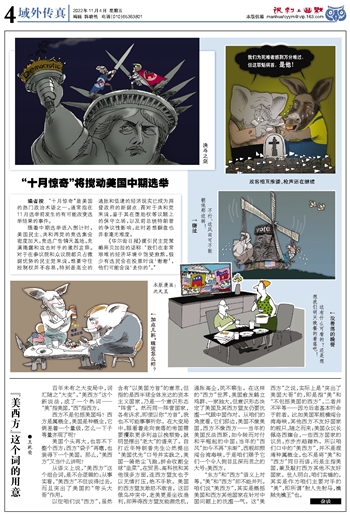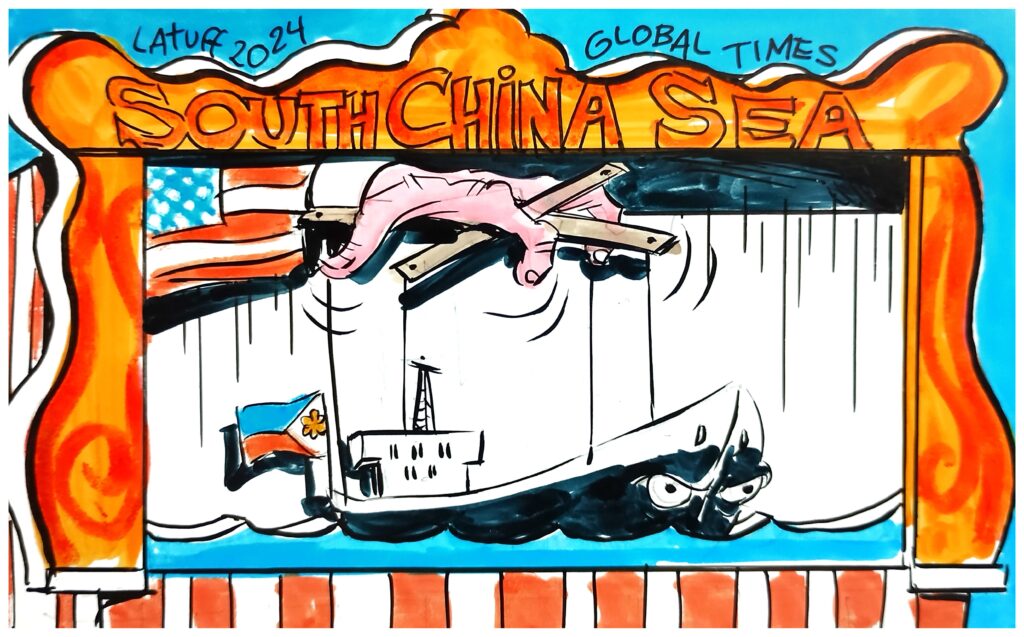The People’s Daily refers to “US-West” as “part of the vocabulary of the great changes unseen in a century,” referring to a phrase favored by Xi Jinping to characterize shifts to the geopolitical landscape brought about by the decline of the US and the rise of China. The official Communist Party “mouthpiece” acknowledges that “this new expression has become a popular buzzword.”
And they’re not wrong: the rise of “US-West” in PRC rhetoric has been meteoric, going from relative obscurity to near-ubiquitousness within the space of a single year. From 2014 to 2024, annual occurrences of the term on PRC websites went from just 457 in 2014 to over 37,600 within the first nine months of 2024 alone. In Hong Kong, where speaking of a monolithic “West” in adversarial terms had never been mainstream before the ongoing national security crackdown began in 2020, the shift has been even more stark. Local officials have leapfrogged straight to angry denunciations of the “US-West,” with every “patriotic” politician and Party-linked thinker now peppering the phrase into their speeches and published writing.
“When we said ‘the West’ in the past,” the People’s Daily wrote in their 2022 piece on the phrase, “it referred to all developed capitalist countries in the Western Hemisphere, which constituted an ideological camp.” The difference now is that these nations are no longer linked by a shared belief system, but rather by a shared fear of their ally — their nominal ally, state media might say — the United States:
“Countries in the same camp still have their own demands. Even if they saw America as their leader, they didn't follow all of its demands. In the changes unseen in a century, however, the declining US Empire must seize every advantage it can… Even [America’s] Western allies have been mercilessly suppressed. They dare not speak out, but must hold back their silent fury.”

Just Following Orders
According to this view of the world, there is no global alliance of democracies emerging to push back against aggressive autocracies like China and Russia. There is just the moribund US Empire lashing out in its death throes.
While the use of “US-West” is new, however, this frame about the US and its imperial ambitions is a well-established mainstay of PRC propaganda. Long before it was used to reduce Ukrainians defending their homeland to mindless pawns of the US, it was used to discount the concerns of neighbors like the Philippines. As the two continue to clash over overlapping claims in the South China Sea, Chinese media have framed the Philippines not as a nation of equal standing defending its borders but as a reluctant puppet of Washington, feigning interest in its maritime realm to serve as a proxy in containing China. The bellicose Global Times, part of the People’s Daily group, has called Manila’s moves to defend its outposts “a staged puppet show.”
The same frame is also used against the PRC’s own citizens, or those it regards as its rightful subjects. The official CCP history of the 2019-20 Hong Kong protests suggests they were an attempted “color revolution” instigated and led by the US — not a mass popular movement for democracy and autonomy that drew millions of willing supporters to both the streets and the ballot boxes. Similarly, Taiwan’s elected leaders do not represent their voting population’s ambitions for nationhood and recognition but are merely “dogs” of the US.

Shoot First
China has often been dismissive of what it calls “small countries,” despite its claim to broadly represent developing nations in the face of Western dominance. As the People’s Daily suggests clearly in defining the “US-West” neologism, framing US actions as dismissive and insensitive is precisely the point. “When we say ‘US-West,’” the paper writes, “we are highlighting the complicity of the US and the rest of the West in targeting China.” America, the writer acknowledges, is “the main target” while “irritating other unfriendly countries” is a bonus.
In this version of global politics, in which great powers alone have agency and others are relegated to liegedom, the only country the phrase “US-West” demonstrates respect for is the one it is meant to offend most. “Everyone in the world understands that our main target is our main adversary, the United States,” the article concludes, ending with a line lifted from classical Chinese poetry: “When shooting someone, shoot their horse first; when catching thieves, first take out their leader.”

Ryan Ho Kilpatrick
The CMP Dictionary
C
D
F
G
M
N
P
S
- Scaling the Wall
- Science
- Second-Generation Reds
- Security
- Seeking Progress in Stability
- Seeking Truth From Facts
- Self-Revolution
- Seven Bottom Lines
- Six Adheres
- Smart Governance
- Sneaky Visit
- So-Called
- Socialite
- Soft Resistance
- Soul and Root
- Soundless Saturation / Quietly Nourishing
- Sovereignty
- Speaking Politics
- Streamlining Services
- Strong Cyber Power